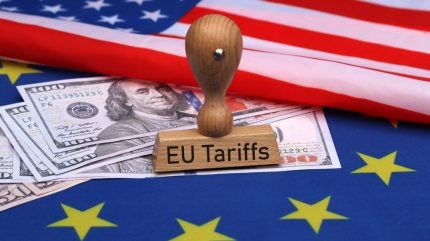
Following Trump’s decision to implement 15% import tariffs on goods from the EU, the US President has signed an agreement with the union, laying out tax rates for generic and branded pharmaceuticals.
Through the clarification of the EU-US trade deal, generic pharmaceuticals – which make up 90% of US prescriptions according to the Association of Accessible Medicines – will now be subject to the new US Most Favoured Nation (MFN) tariff rate. This special tax will also apply to generic active pharmaceutical ingredients (APIs).

Discover B2B Marketing That Performs
Combine business intelligence and editorial excellence to reach engaged professionals across 36 leading media platforms.
The MFN rate is described as a standardised, non-discriminatory tariff that is applied to all trading partners of a country under the World Trade Organisation (WTO) unless a lower rate is agreed upon.
Though the Trump Administration has not yet disclosed the exact MFN rate, a EU-US trade deal Q&A from the European Commission (EC) states that MFN-designated tariffs will be “effectively zero or close to zero” once they come into effect on 1 September 2025.
However, branded pharmaceuticals will not be exempt, with a blanket rate of 15% being placed on them and their constituents – despite the EU producing 43% of the APIs used in US-prescribed branded pharmaceutical products, according to the US Pharmacopoeia.
Though branded products will be subject to the full tariff rate, the Trump Administration has vowed to cap tariffs at 15%, providing a little more certainty for European-based pharma and drug manufacturing companies.

US Tariffs are shifting - will you react or anticipate?
Don’t let policy changes catch you off guard. Stay proactive with real-time data and expert analysis.
By GlobalDataEU tariff uncertainty addressed, but questions remain
Though GlobalData’s analysts predict that the US-EU trade deal could lose the pharmaceutical industry anywhere between $13bn and $19bn, the 15% rate will be welcome compared to the 200% tariffs Trump previously threatened to implement on drugs entering the US.
GlobalData analyst, Eoin Ryan believes that EU member states are likely to continue to pressure EC trade negotiators around the pharmaceutical sector. Ryan said: “EU trade commissioner Maros Sefcovic has said that while the agreement “locked in” significant exemptions, EU negotiators will push for more products to escape the 15% tariff rate. More likely than not, these key demands will go unanswered in the current geopolitical environment.”
Meanwhile, Hannah Hans, GlobalData’s Head of Strategic Intelligence, Pharma, noted that 15% tariffs on EU pharmaceutical products are “likely to erode profit margins in the EU pharmaceutical industry and disrupt established trade flows.”
“While less severe than earlier tariff threats, the measures still heighten drug pricing pressures and may redirect investment decisions across markets and product portfolios, with longer-term implications for competitiveness and patient access,” Hans added.
Hans also stated that MFN tariff rates on EU APIs would raise production costs, while eroding the competitive position the EU API and generics industry has previously enjoyed. “For generics, even modest tariff shifts could alter operations and cost structures, putting additional pressure on already thin margins,” she said.
The European Federation of Pharmaceutical Industries and Associations (EFPIA) has also voiced its concerns, with director general Nathalie Moll, noting that she was “concerned for the future of patients and the pharmaceutical sector in Europe” in a 21 August statement.
Additionally, Moll said that the deal could impact Europe’s ability to collaborate on new treatment development, as “billions of Euros will be diverted away from medical research”.
Moving forward, the EFPIA has called for exemptions on innovative medicines in a bid to protect patients and maintain the EU pharma industry’s standing in the market.
Liam Maddison, value & access consultant at Syneos Health, echoed this sentiment in a LinkedIn post, stating that tariffs present “real risks of patient cost increases, supply chain disruption and shifting global price dynamics”.
“In this new environment, companies can’t control tariff decisions, but they can control how prepared they are when these shifts spill over into market access discussions,” Maddison added.
Navigate the shifting tariff landscape with real-time data and market-leading analysis.
Request a free demo for GlobalData’s Strategic Intelligence here.




